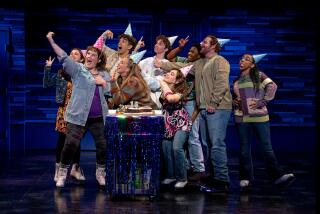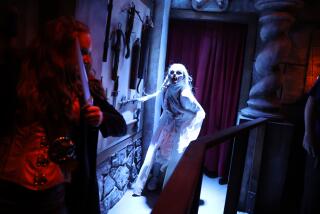‘This is the ultimate creature’: How ‘Frankenstein’ comes alive in Beverly Hills
The idea that Four Larks, the self-described junkyard opera company, would adapt Mary Shelley’s “Frankenstein” seemed predestined.
“In some way, every piece we make has been a Frankenstein, a creature we’ve pasted and glued together,” director and composer Mat Sweeney says during a break in rehearsals for the world premiere production running through March 7 at the Wallis Annenberg Center for the Performing Arts. “This is the ultimate creature that we’re assembling.”
Like the novel’s protagonist, Dr. Victor Frankenstein, the company has formally based its craft on assemblage, collecting disparate items, or body parts in Frankenstein’s case, and combining them in lively and imaginative new ways. The libretto by Sweeney and Jesse Rasmussen adheres closely to Mary Shelley’s 1818 text, written when the author was but 18 alongside literary lions like Percy B. Shelley (her married lover) and Lord Byron while on respite in Geneva, Switzerland, where the novel is set.
Claire Woolner stars as Shelley, and Four Larks regular Max Baumgarten is the creature. Bookended by a series of letters written by Robert Walton, a sailor aboard a ship frozen in the Arctic, to his sister in England, Shelley’s story provides the basis for a fractured telling of secondhand accounts, telescoping and collaging narrative.
“We’ve Frankensteined the text,” Woolner says of a libretto consisting mainly of Shelley’s prose but also her diary and other writings. “The greatest challenge for me is that I’m shifting. Where am I the person writing and creating? Where am I the person who’s telling the story of my past and remembering how good it felt and how painful it was? So it’s allowing the text to be clear and doing diligence as the person speaking, but also being the three-dimensional version of Mary, a person who wrote these words for a reason.”
In keeping with the quilted nature of the piece, Sweeney’s score is played by his cast and collaborators doubling as musicians between and during their turns at center stage.
“We’re definitely pulling a limb off of jazz and a limb off of classical and sort of embracing the strange thing that comes out of that,” Sweeney says.
The music is driven by the written word in a way that previous Four Larks productions like “Orpheus” and “Temptation of St Antony” were not. “I’m writing for specific voices and being informed and collaborating on the arrangement with all of the performers themselves,” Sweeney says. “So the score will be reflective of the amazing bodies you hear onstage.”
The lessons of Shelley’s seminal text are legion: an admonition to humankind about playing God, an allegory on the significance of empathy and the oft-cited warning about the unforeseen dangers posed by technology.
“I shuddered to think that future ages might curse me as their pest, whose selfishness had not hesitated to buy its own peace at the price perhaps to the existence of the whole human race,” Frankenstein says of his unintended legacy.
That legacy can be found in social media platforms that began as virtual gathering grounds and have since been infected with campaigns of misinformation and hate. And then there are those who fear artificial intelligence could open the mother of all Pandora’s boxes.
“We’re looking at something new and unexpected, and it’s hard to predict how it will change our society, our culture, our planet,” says production designer-choreographer Sebastian Peters-Lazaro. “It’s thinking about people beyond yourself, the planet, and how it could impact those things.”
Four Larks is the brainchild of Sweeney and Peters-Lazaro, collaborators since they were students at UCLA about 15 years ago. Their 2008 inaugural production, “The Invitation,” staged in Oakland, led to future site-specific performances. A four-year sojourn in Melbourne, Australia, ended in 2014 with a return to California and an acclaimed production of “Orpheus” in a fashion district warehouse in downtown L.A. followed by a residency at the Getty Villa.
“We’ve been working in site-specific realms and letting the architecture and history of the place guide the narrative,” says Sweeney, who is happy not to have to run his own venue for a change. The Wallis’ 150-seat Lovelace Studio Theater represents a profound shift for the company, which is performing inside an American theater for the first time.
“We are starting with a black box and building it from the ground up. We’re using a part of our process, but we’re adding a lot in what’s possible with light and sound and the visual world of our production in a contained space,” Sweeney says, pausing to run through some of the million production details in his head. He shrugs. “Really it’s just flexing a different set of muscles.”
‘Frankenstein’
Where: Wallis Annenberg Center for the Performing Arts, 9390 Santa Monica Blvd, Beverly Hills
When: 8 p.m. Tuesdays-Fridays, 2:30 and 8 p.m. Saturdays, 2:30 and 7:30 p.m. Sundays, extended through March 7
Tickets: $60
Info: (310) 746-4000, thewallis.org/Frankenstein
Running time: 1 hour, 15 minutes
You always can find our latest news and reviews at latimes.com/theater.
Support continuing coverage of local theater. Become a digital subscriber.
More to Read
The biggest entertainment stories
Get our big stories about Hollywood, film, television, music, arts, culture and more right in your inbox as soon as they publish.
You may occasionally receive promotional content from the Los Angeles Times.










